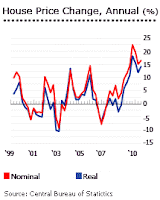Despite tighter lending policies and repeated warnings from the Central Bank, house prices continue to rise in Israel at double-digit rates. Although the rate of increase has somewhat eased, the monetary authorities are clearly worried. The average price of owner-occupied dwellings rose 16.4% y-o-y and 4.4% q-o-q to Q3 2010, according to data from the Central Bureau of Statistics. Although the annual price increase was lower than the 22% surge in Q4 2009, it was the sixth consecutive quarter of double digit price increase.
Strong price increases were seen throughout the country. In Tel Aviv, the economic centre, the average house price rose 17.75% y-o-y to ILS 1.778 million (US$499,245). In Jerusalem, the 17.5% price increase pushed average prices to ILS1.42 million (US$398,216). Annual price increases in other administrative regions ranged from 15% in the South, to 20% in Haifa. The current upswing in house prices has pushed the national average price, at ILS1.05 million (US$294,660) up by 37% during the period from Q4 2008 to Q3 2010. Over the same period, the average price in Tel Aviv has risen by an astonishing 46%, and in Jerusalem by 30%.
Although strong economic growth, low interest rates and the long period of relative peace (i.e. there are no major hostilities) provide a basis for strong price increases, speculative investment is clearly playing a role in pushing house prices. Loose monetary policies are also making funds for speculative buying easier to access. Excessive house price growth was cited as among the reasons for raising the key rate several times in 2010 (in March, July and Sept).
Housing in Israel is also a political tool. In some areas, house prices are depressed by huge amounts of new construction, especially in new settlements in disputed areas. Buying houses in these areas is viewed by some Israelis as part of their patriotic duty. The Bank of Israel, the central bank, is expected to raise key interest rates n January or February to contain inflationary pressures. The headline rate, at 2% since October 2010, is expected to be raised by 25 percentage points.
Source Global Property Guide

No comments:
Post a Comment